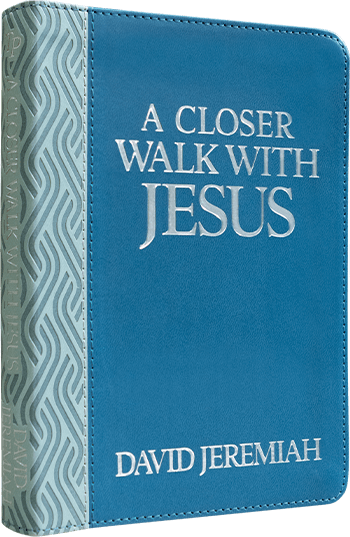From the March 2024 Issue

Online Exclusive: From This Point Forward
Making Change
It’s remarkable how many revolutionaries throughout history have drawn inspiration from their Christian convictions, but we shouldn’t be surprised. Without being irreverent, we can say Jesus was the greatest revolutionary of all time. He worked among the poor and shared the Gospel with the destitute. He loved everyone and stood up for human rights. He was intrepid, and His followers in the book of Acts continued His cause. Two thousand years have passed, and the revolution has never faltered.
Our Lord’s primary revolution, however, is spiritual—in the heart. He told the Roman governor, “My kingdom is not of this world. If My kingdom were of this world, My servants would fight, so that I should not be delivered to the Jews; but now My kingdom is not from here” (John 18:36). The apostle Paul said, “For the kingdom of God is…righteousness and peace and joy in the Holy Spirit” (Romans 14:17).
The world needs spiritual change, transformation, and revival.
Change First Comes From Above
Colossians 3:1-2 says, “If then you were raised with Christ, seek those things which are above, where Christ is, sitting at the right hand of God. Set your mind on things above.” Ezekiel was flung into ministry because he heard “a voice [that] came from above” (Ezekiel 1:25). Proverbs 14:14 says the Lord’s people “will be satisfied from above.” The psalmist was delivered from above (Psalm 18:16). According to James 1:17, every good and perfect gift comes from above. Later in the same epistle James talked about “wisdom that is from above” (3:17). Jesus summed it up in John 8:23, saying, “You are from beneath; I am from above.”
This world needs a revolution from above, one which Christ produces in our hearts when we enthrone Him as Lord and Master.
Change Then Comes From Within
This change then works within us. Jesus proclaimed in John 7:38, “He who believes in Me, as the Scripture has said, out of his heart will flow rivers of living water.” While our Lord’s teachings may sometimes move men and women to political revolution and freedom, the primary work He does is daily, and it involves you and me. It’s a revolution of the heart. Great Christians are great revolutionaries, and that makes them world changers. St. Basil, who lived in the 300s, established the first hospital, extending the healing ministry of Jesus Christ to the masses. William Tyndale was martyred for his efforts to make the Bible available in English. William Wilberforce was a Christian leader whose stand against slavery led to the abolition of slave trade in the British Empire. Lord Shaftesbury, inflamed by Christ, led the movement to rescue children from the factories and mines and place them in schools. Elizabeth Fry is remembered as the “Angel of Prisons” because of her incessant efforts at prison reform in nineteenth-century England. Behind her reformer’s zeal was an abiding desire to wake up every morning to serve the Lord. Before she passed away, she affirmed that she had never awakened from sleep, whether in sickness or in health, without her first waking thought being: “How best may I serve my Lord?”
Change Then Moves Out
As these stories show, the change from above works within us and then moves out to the world. William Booth was a British Methodist preacher who developed an intense burden for the poor of Victorian England. He started an organization called the Christian Mission, and its purpose was to aid the destitute. One day Booth and his son Bramwell met an associate named George Railton. They began working on a written report of their work, and they used the words “volunteer army.” Bramwell didn’t like the word “volunteer,” and his father agreed. “No, we are not volunteers for we feel we must do what we do, and we are always on duty,” he said.
Taking the pen, Booth scratched out the word “volunteer” and wrote in its place “salvation.” It was as if a bolt struck the room. Suddenly the three men knew their work should be called the Salvation Army, and it was a revolution that changed the world in its day and still is.
We can’t all sponsor highly visible campaigns, but we can do small things every day. We can be revolutionaries in a host of little ways. You can write a letter, visit a hospital, devote yourself to regular prayer for a missionary, volunteer in your church, check on your neighbors, keep the nursery, say a kind word to the postal carrier, give a copy of this magazine to a passerby. You can support the work of your local church without criticizing things you don’t like. The Bible warns us against despising the day of small things (Zechariah 4:10).
That’s the way revolution occurred in the book of Acts. Some of the revolutionaries were named Peter, Paul, Barnabas, and Apollos. But others bore names like Ananias, who helped lead Paul to Christ, and Tabitha, who was “full of good works and charitable deeds which she did” (Acts 9:12, 36). Some were well known, but most were humble and obscure—but not to God.
C. S. Lewis wrote, “As Christians, we can’t love the whole world. But we should remember that God has placed us in a specific community at a particular time. We’re called to love those around us. Loving them means serving them—and in doing so, we become the best of citizens.”1
Consider Richard Kirkland, who fought at the Battle of Fredericksburg during the Civil War. At the close of the first bloody day, the battlefield was strewn with the dead and wounded, and many of the dying were crying for water. Their thirst was intense, and agonizing cries went up from everywhere, crying, “Water! Water.” Finally Sergeant Kirkland could stand it no longer. Going to his commanding officer, he asked permission to take water to the fallen soldiers. The answer was “No,” for he would surely be shot by the enemy. But he persisted, telling his commanders he was willing to run that risk if he could help the dying.
His superior said, “Kirkland, it’s sending you to your death…I hope the Lord will protect you.” Sergeant Kirkland ventured onto the field, and somehow everyone along the Union lines realized what he was doing as he tenderly lifted the heads of dying men and gave them a drink of water. He devoted ninety minutes to his errand of mercy and not a shot was fired at him. He’s been called the angel of mercy at the Battle of Fredericksburg.2
According to Jesus, even giving someone a cup of cold water is a revolutionary act, for revolution means making a positive impact on our world. We can all be revolutionaries. We can all be angels of mercy.
Can you summon the courage to change the world around you?
Where can you make a difference for God?
Sources:
11C. S. Lewis, quoted by Jan Karon, A Continual Feast (NY: Viking Press, 2005).
2S. B. Shaw, Touching Incidents and Remarkable Answers to Prayer (Noblesville, IN: 1965), 345-246.
More Articles
This Month's Magazine Resource
Subscribe Now
Each month, read articles and devotionals from Dr. David Jeremiah that will encourage, challenge, and strengthen your walk with the Lord.















 Turning Point for God is a tax-exempt, not-for-profit, religious corporation as defined under Section 501(c)(3) of the Internal Revenue Code. Your donation gift(s) are very much appreciated and may qualify as a charitable deduction for federal income tax purposes.
Turning Point for God is a tax-exempt, not-for-profit, religious corporation as defined under Section 501(c)(3) of the Internal Revenue Code. Your donation gift(s) are very much appreciated and may qualify as a charitable deduction for federal income tax purposes.




